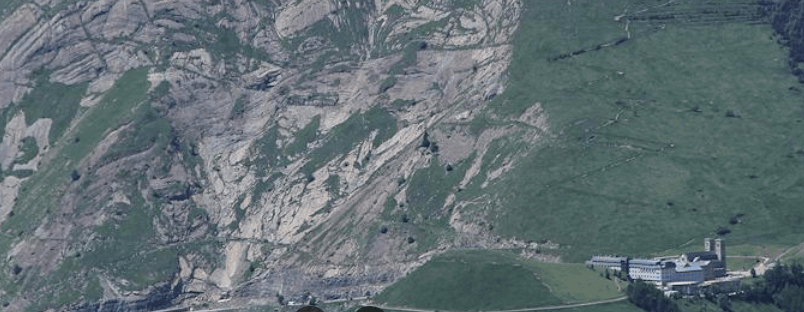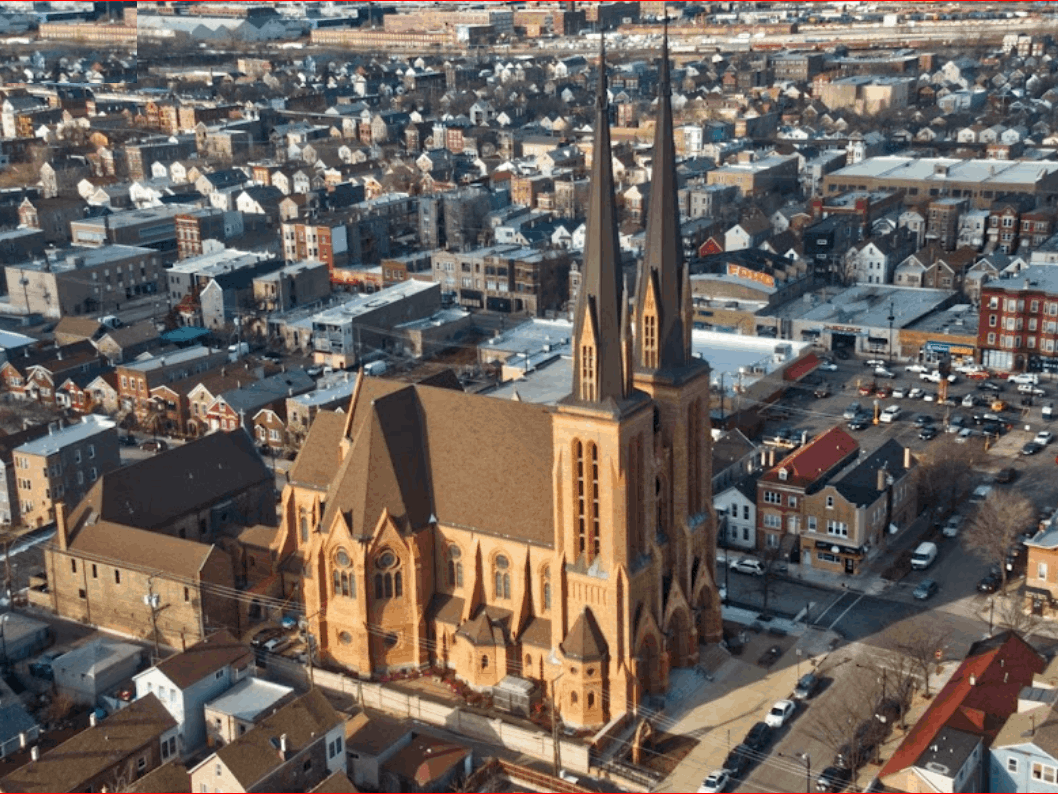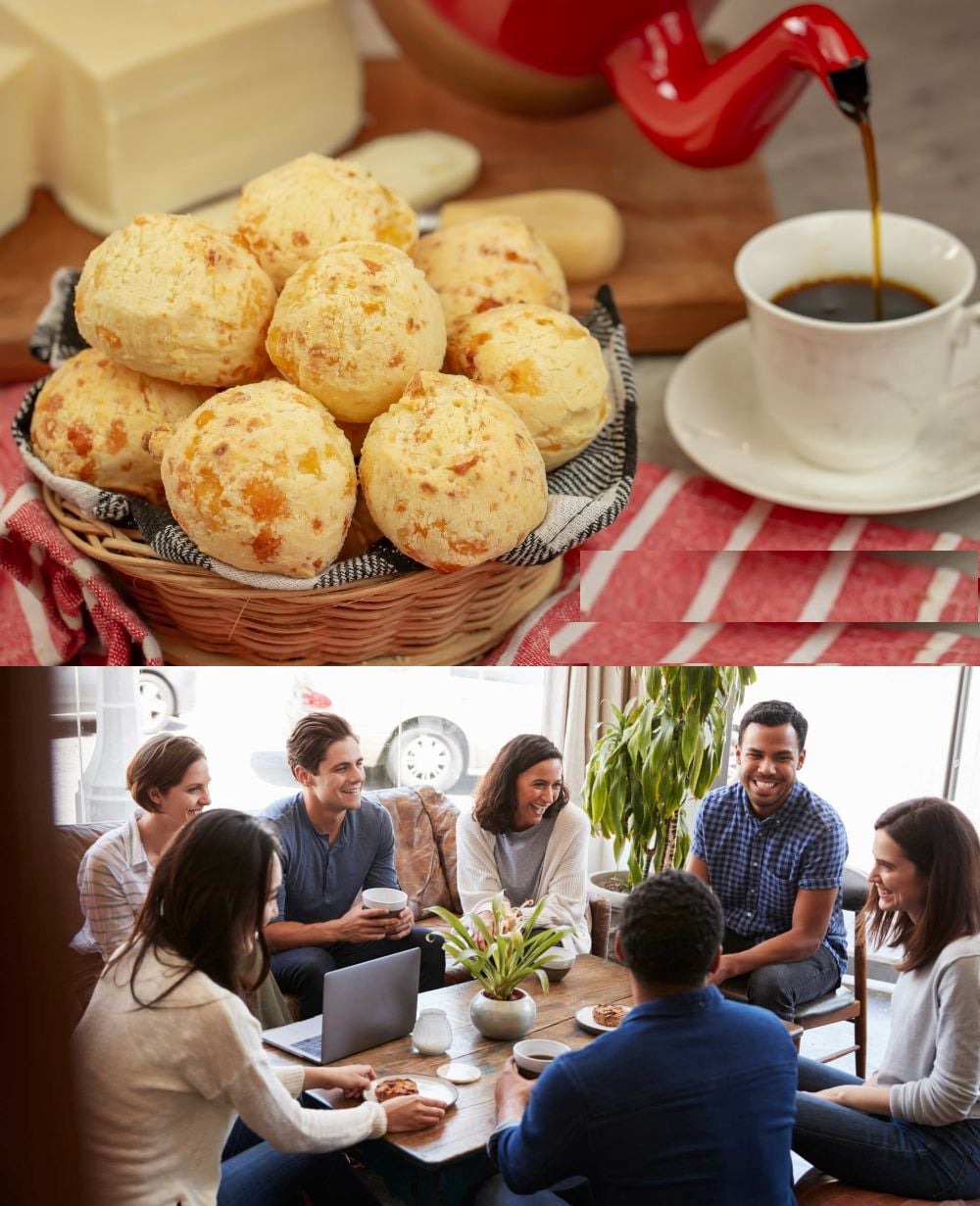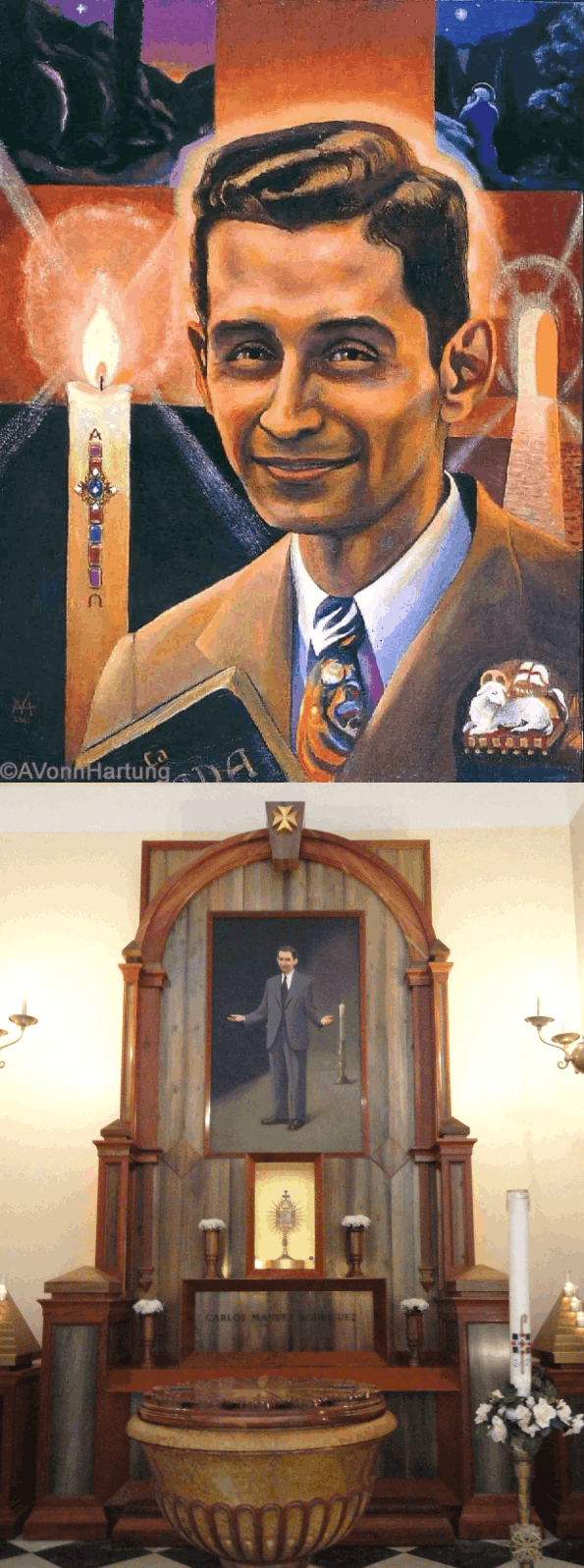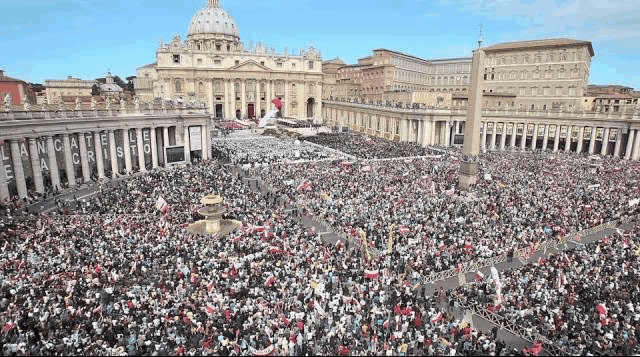La Salette Social-Net (#ILoveMySundayMass)
"Come, my children, come! Fear not!
I AM HERE TO PROCLAIM GOOD NEWS TO YOU."
1- Brief Summary of Our Blessed Mother Personal Visit to Humanity on September 19, 1846.
Her First Words:
"Come, my children, come! Fear not, I am here to proclaim great news to you."
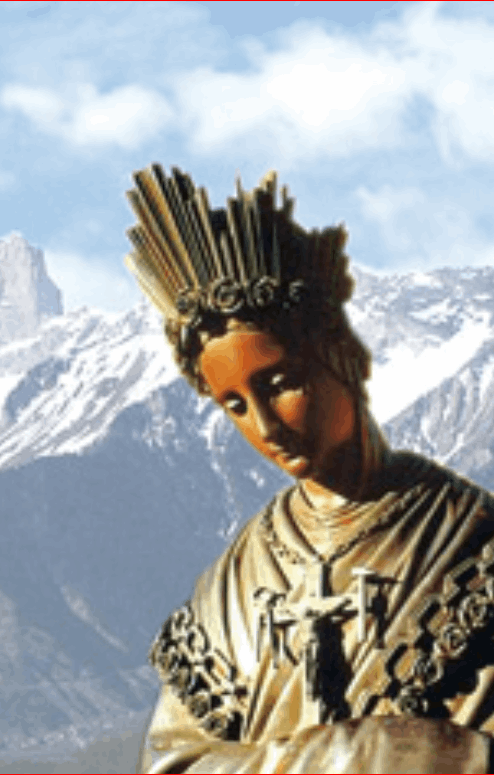
1.1- Our Lady Came To La Salette, France (1846).
On September 19th, 1846, 11-year-old Maximin Giraud and 14-year-old Mélanie Calvat were minding cows in a small village in Southeast France. While returning home, they encountered a bright light. In the light was a sitting woman, weeping into her hands. Maximin would later say: “She was like a mother whom her own children had beaten and who had escaped to the mountain to weep.”
1.2- The children approached. The unknown lady, while still crying, told the children about the trials of Her Son. She explained that she and Her Son are weary from the sufferings they have endured for humanity.
She lamented for those who work on Sunday, the Lord’s Day, instead of resting and praying. In addition, the cart drivers continued to swear with Her Son’s name (among many other blasphemes). In the winter, people attended Mass just to scoff at religion, and in the summer, they ignored it altogether.
1.3- Our Lady explained that the potato famine across Europe the year before was a warning. If the people did not convert their hearts, more famine awaited them. If they do, then there will be an abundance of food. Part of the scourge of famine was avoided because many Catholics changed their habits after hearing about the apparition; and in that region it was less severe than in other countries in Europe.
1.4- Today, more than ever, Our Lady's messages at La Salette are for everyone, not just for the residents of La Salette who have been there for many years. No! She makes it clear [that even today] she intercedes for us more than we could ever repay or expect. Her words are a message of conversion to Jesus and his Church.
2- 2024: The Starting of a New Grassroots Apostolate
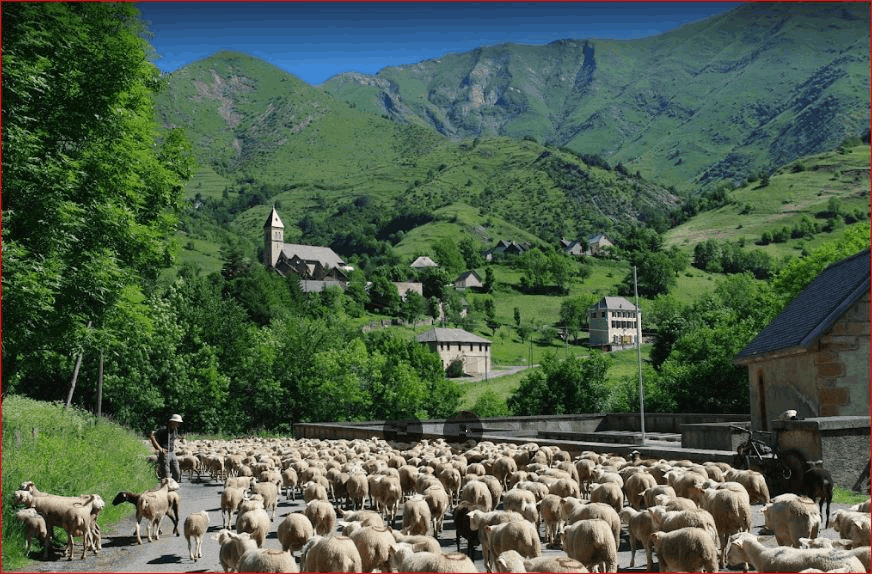
2.1- About The LaSalette Social-Net Apostolate & Missionary Outreach.
In summary, as requested by Our Lady explicitly and implicitly when she appeared at La Salette (France), the main objective of this international catechetical Apostolate is to teach and invite Catholics, especially non-practicing and lukewarm Catholics, to better understand, obey, and share the "Five Commandments of the Catholic Church." Although deeply bonded by God’s Ten Commandments and rooted into the Sacred Tradition from day one, they are dismissed or simply ignored by the great majority of irresponsible Catholics as if optional or mere suggestions, but not divine Precepts which they are. Some even consider it a kind of five "jokes," fake man-made obligations not worthy to be learned, much less to submit one’s life under them.
2.2- No wonder Our Lady at La Salette, our loving mother, cried tears of sadness for having no choice but to warn of severe consequences against Christendom and, therefore, the world, if at least the "Lord's Day" were not minimally respected. And that message preceded her visit and future messages from Fatima-Portugal, almost too late precisely because Christianity didn’t care about her first preventive warnings, at La Salette.
2.3- Such a historical curse of Marxism that she tried to prevent in Fatima -- now deeply aggravated by other ideologies -- would likely never happen if we Christians had appreciated God’s generosity in giving us six days during each week, reserving just one for rest and worship, which is the only way to avoid and secure that humanity would not live by instinct, like wild animals and its consequent ego-path of gradual self-destruction.
3- Who Can Survive Without Breathing? Even More so: Who Can Preserve God's Grace Without Spiritual Breathing?
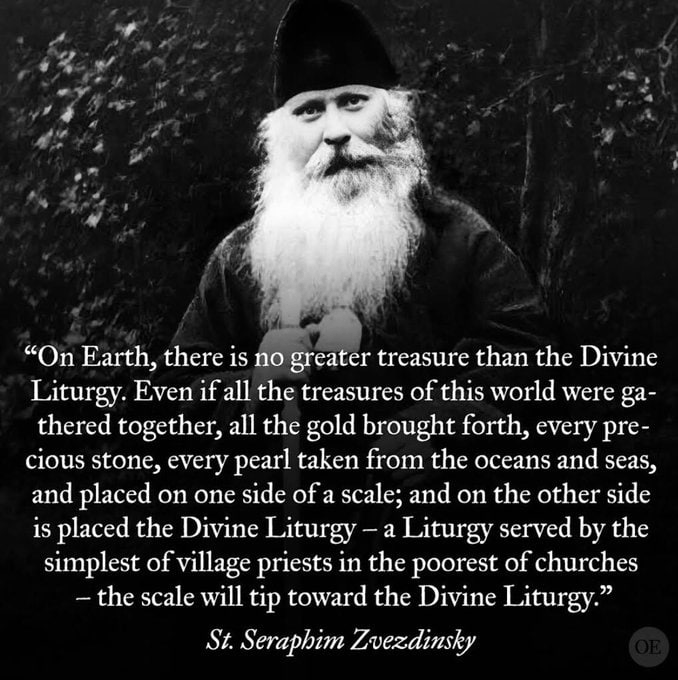
3.1- The Essence, The Very Minimum...
Basically, each one of the Five Commandments of the Catholic Church, even when combined, only mandates the absolute minimum -for the benefit of the faithful- that any Catholic must observe in order to have and preserve the Grace of God during a lifetime just to "survive," not thrive. Let’s start by remembering Our Lord’s declaration for each one of us: "If you do not eat my flesh and do not drink my blood, you will have NO [real] Life (capital ‘L’ = fullness of Life, Peace, Hope,... at least on earth) in you!” Therefore, the very first Commandment of the Church ordered and reminded us to minimally "Keep the Lord’s Day by -at least- participating in the Sunday Mass every Sunday (plus 'days of obligation')".
3.2- The second Precept requires the "Confession of our sins at least once a year."
3.3- And the third "To receive the Eucharist at least once a year." These, alone, are already a life-or-death determinant; let’s imagine when adding the other two Precepts into the same balance. We cannot, without His aid, worthy build our lives and our world.
3.4- If we neglect or compromise the ordinary means or necessary paths that God has determined as a condition for the granting of His daily Peace, we will not have true Peace; at least not until we are duly corrected by a sincere conversion and docility. The rejection of His Grace, even if implicit or partially unconscious, cannot fail to have very serious negative consequences. In fact, especially in cases of explicit rejection, regardless of how long and how much we “pray,” beg or insist, on a personal level -case by case- God will remain unresponsive, so to speak, in practical terms. Meaning that God indeed never give-in, give-up, never convey, never ever part-with, sag, move or subside, until each one of us, personally, decide to reject pride, unforgiveness and disobedience, and decide to learn how to love others, as He Loved us: No exceptions!
3.5- Precisely for this reason God clearly warned us (1 John 3:14) that every Man is “dead,” and that he only passes from death to life after he begins to Love his brothers. In other words: Without exceptions and with true Love. 3.6- However, we cannot forget that "True Love" is not a feeling, but a decision, decision and commitment, fidelity, resolve, works, services, daily struggle (i.e. “for today I will not sin anymore”,...) obedience, acts, etc., as fuel for the Fire in the Holy Spirit. Therefore, never emotionalism, sentimentalism, paternalism, fundamentalism, "naturalism" (pantheism, nudism, veganism,...), not to mention the list of much worse curses, such as Marxism, Terrorism, [reincarnation-based] Spiritism, Satanism, for example. To discern well, it is essential to know the five characteristics of Christ’s Love for us. Five combined radical characteristics, to know if we really Love with the Fire of Christ’s true Love: 1) Love First; 2) Love Unconditionally; 3) Love Concretely; 4) Love Everyone; and 5) Love to the End.
4- Can our Blessed Mother Cried Just to Pretend it, Theatrically, Without Enduring Real Sufferance Out of Her Love for Us?
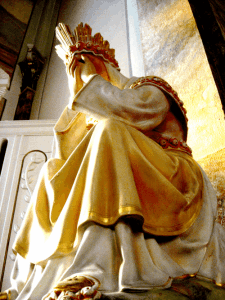
4.1- Our Holy Mother Still "Cry" deeply, in Her Soul!
Not even the profound sadness revealed by Our Blessed Mother at La Salette, to the point of weeping, was enough for humanity to understand the Parable of the Great Banquet (Mt. 22). Jesus compared the whole Kingdom of Heaven with its entry-gate from Earth, which is the Mass in His Church: "[The gate for] The Kingdom of Heaven is like a king who gave a wedding feast for his Son." He dispatched his servants to summon the invited guests to the feast, but they refused to come.
4.2- A second time he sent other servants, saying, tell those invited: ‘Behold, I have prepared a royal banquet; my calves and fattened cattle are killed, and everything is ready; come to the Feast'. Some ignored the invitation and went away; one to his farm, another to his business. The rest laid hold of his servants, mistreated them, and killed them. The king was enraged and sent his troops, who destroyed those murderers and burned their city. Then he said to his servants, "The feast is ready [anyway], but those who were invited were not worthy to come." Go out, therefore, into the streets and the lowly lanes of other cities, and invite to the feast whomever you find. The servants went out, invited and gathered all they found, good and bad alike, and the hall was filled with those who accepted the King's invitation." Sounds familiar? Just look at the kind of people who attend Sunday Mass.
5- May Her Tears Come Down Again and Break our Hearts of Stone, Before it is Too Late!
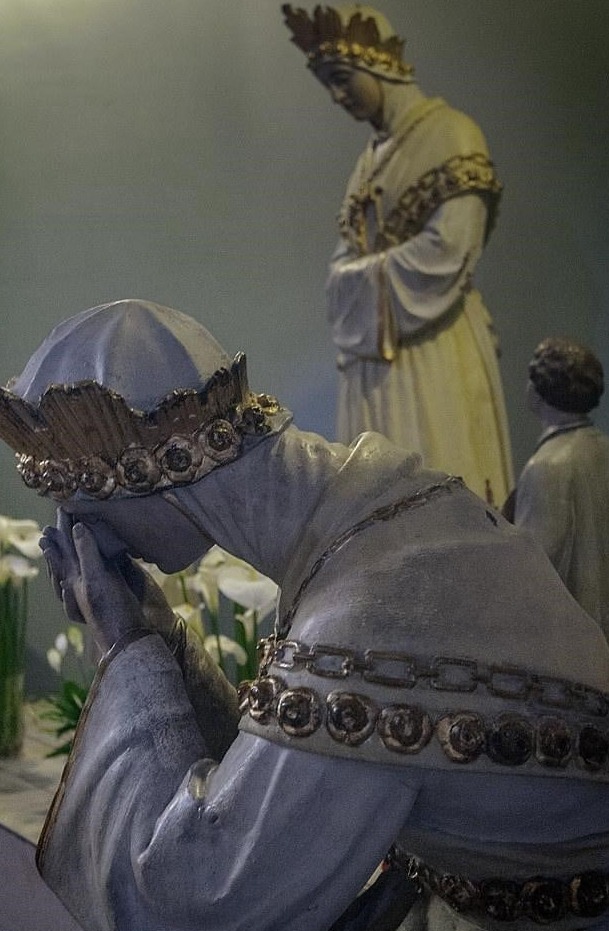
5.1- Hearts of Stones..., For How Long?
The tears that Our Lady shed at La Salette had fallen on hard soil (our hearts and minds), once again not enough for humanity to minimally understand another parable even more clearly: The banquet that the Father gave to His prodigal son after he repented and confessed his sins. Why is it so difficult to realize that such Merciful Father is waiting for so many prodigal sons to return? And that He has no choice but to grant a similar banquet (The Mass) every week (actually every hour, the world over, 24/7), to properly welcome and celebrate the return of every lost son, also revealed at the Parable of the Lost Sheep.
5.2- In addition, for the sake of friends not yet strong in their Faith, let’s concede for a moment that parables are not necessarily proof of factual realities. Therefore, we would like to incorporate over the above parables and so many statements, the real historical fact which happened with the disciples of Emmaus -no longer an analogy- when Cleophas, his wife and/or adult sons invited a complete estrange to stay overnight as a guest, without realizing that they were welcoming the Messiah into their home, despite walking and speaking with Him for so many hours. From this undisputable historical event, we can learn for sure the power-link bonding the nowadays Mass (mystical Supper/Banquet), where Christ is really present under the appearances of bread and wine, with that first ever Sunday Mass (Mystical Supper) that Jesus celebrated for them and with them, in Emmaus. There, inside their home, the first domestic church, after a priceless “homily” granted during their long walk, after the consecration of their bread and the wine, He gave Himself in Holy Communion to Cleophas, his wife Mary, and likely some grown up children or servants.
6- Historical Fact! Therefore Not just an Analogy or Pedagogical Lesson
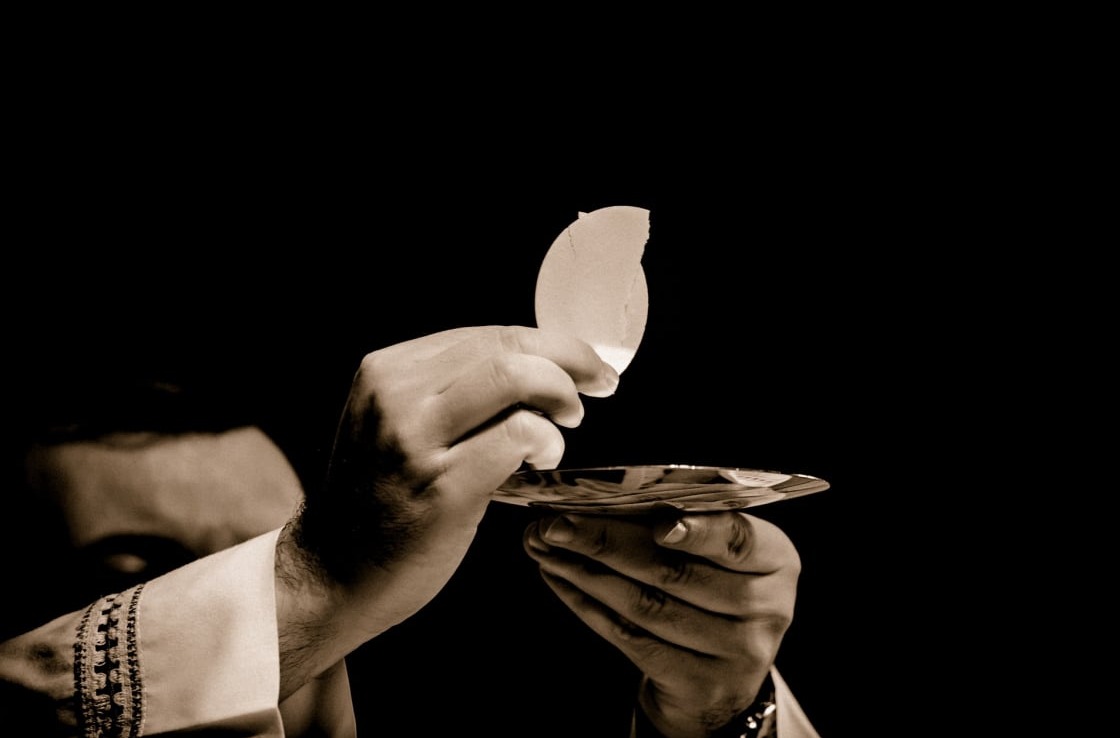
6.1- The First Sunday Mass...!
It’s critically important to understand that they only recognized and realized what really happened when Jesus broke the bread, said the prayer of blessings, and gave to them to eat and drink. At that moment, Jesus disappeared -but only visually- vanished from the table, in the same way He is invisible at the Mass “table” (altar), since they no longer need to see Him, in order to know that He is really there, under the appearance of bread and wine then transubstantiated into the living body, blood, soul, and divinity of Christ resurrected. 6.2- Evidently, for the rest of their lives, they recognized who was really there, celebrating that first Sunday Mass, at the same day He raised from the dead, in a similar way that we now recognize the mystery of a Priest acting “in persona Christ,” during the miracle of the transubstantiation, which happens during Masses celebrated within the Church founded by Christ.
6.3- The venerated Mother Angelica, beloved the founder of largest Catholic Radio and TV network in history (EWTN), often reminded us that not even the Angels have the privilege to suffer or offer sacrifices to console God and alleviate the suffering of others, much less the privilege to receive the divine Redeemer via Holy Communion.
7- The Litmus Test!
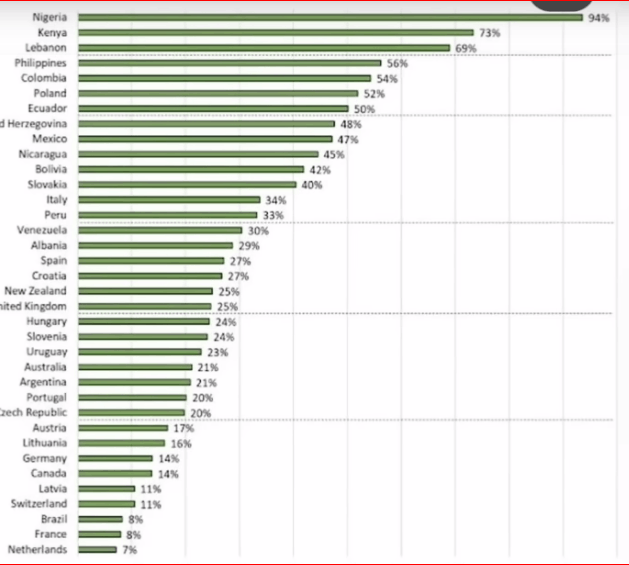
7.1- Sunday Masses' Attendance
Let’s consider the Sunday Mass attendance in Brazil, for example, since it is the country with the largest Catholic population in the world: Only approximately 8% attend Sunday Masses regularly. Simply unbelievable, if such survey is reasonably truthful (see side graphic).
7.2- On the other extreme, i.e., Catholics in Nigeria (94%), although complying in terms of massive presence at Sunday Masses, it seems that many go to a mere cultural event by emotional habit since their faith doesn’t concretely reflect in their practical public and political life. We all ‘forget’ -in practical terms- that God ‘cannot’ vote, God ‘cannot’ get organized (in our behalf) to put corrupt politicians in jail, etc. We, as a responsible Christian community, must do it, energetically, publicly, electing tough Christian leaders, praying and fast for it, etc., out of our duty of faith (as El Salvadorians did), and also funded by our own financial resources -as complement to taxes- whenever necessary.
7.3- Jesus never called us to be spectators of Masses, but courageous disciples ready to engage the culture despite persecutions, boldly building a Christian-based Civilization as protagonists empowered by Masses. Faith without works is not only false, it will also be the main criterion for condemnation (sins of omission) of any human being who, during the Final Judgment, is condemned to hell: "Depart from me, you cursed! Go into the eternal fire (...) For I was (...) and you did not help me, and whatever you did not do... to any of these in need, it was to me that you did not do it!" (Matthew 25:31-46). "I know your works! You are neither cold nor hot. So then, because you are lukewarm, I will vomit you out of my mouth" (Rev. 3:15-16).
7.4- In any case, the crucial point we are trying to emphasize here is that both extremes (present everywhere) are profoundly affected in a negative way, by the lack of knowledge and shallow interpretation of these Five Commandments of the Church:
1st. You shall attend Mass on Sundays and holy days of obligation.
2nd. You shall confess your sins at least once a year.
3rd. You shall humbly receive your Creator in Holy Communion, at least during the Easter season.
4th. You shall observe the prescribed days of fasting and abstinence.
5th. You shall help provide for the needs of the Church.
8- Original Pride and Disobedience Almost Destroy Human Nature. Only Obedience and Humility Can Remedy it, at least at a Personal Level.
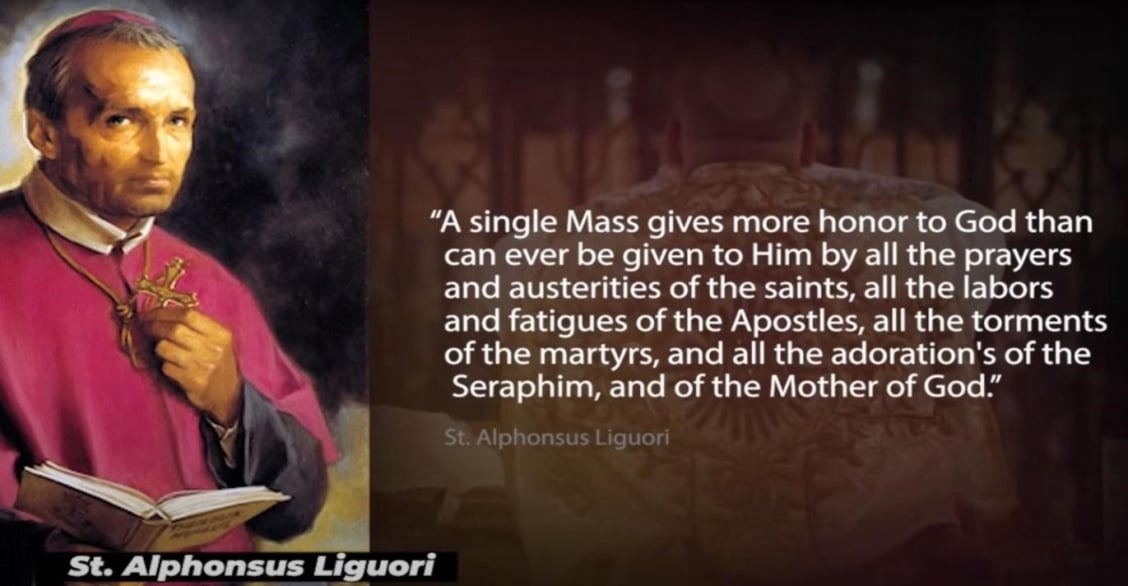
8.1- Obedience is the door of Salvation!
Interestingly that such priceless and lifesaving respectful submission -as a whole or partial obedience- are all directly related to the quality, the possibility, consistence, quantity, reverence, and gratefulness of Mass attendance -the essence and summit of our Faith- by each individual faithful, throughout life. Pope Francis said that “If we leave [each] Mass the same way we entered, something is wrong!” We hope that, by God’s Mercy, whenever it happens, it would be sporadic carelessness, therefore meaning -hopefully- that “something went wrong” at that particular Liturgy, and never that “something is essentially wrong” with any one of us.
9- Can someone obey 99% of all Traffic Laws, but systematically ignore just one, such as the Stop-Sign, for example, without dying or killing?
The best answer is: Probably both! Killing and, sooner of later, also Dying.
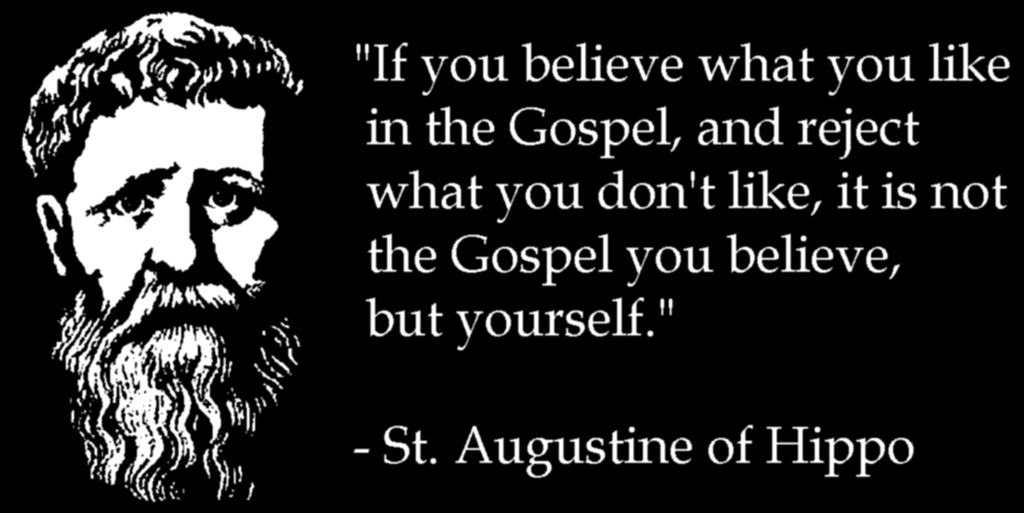
9.1- But it is just one minor Law!
Unfortunately, realistically and tragically, that is the case for the great majority of Catholics, forgetting that if we are faithful with little thing, we will certainly be faithful with the more important ones. Even sincerely practicing Catholics frequently dismiss, for example, the 4th Commandment, alleging it is “just” one of the Church’s Commandments, presumed irrelevant by many, without realizing that such personal arrogant presumption (thinking to know better than the Church, as if a mere human institution) is a very serious sin of the intellect.
9.2- Thomas a Kempis (Imitation of Christ) teaches us, with great theological accuracy, that “the sins of the mind are worse than sins of the flesh” (they cannot be “felt,” difficult to discern, etc.), although they are fundamentally intertwined with pride and the original sin of disobedience[of a “minor” law], despite God’s warning: “If you disobey and eat the forbit ‘fruit’, you will die.”
9.3- Paraphrasing St. Augustine -mutatis mutantis- since still within the same supernatural context, “If you obey only what you like in God’s Commandments and ignore (worse than refusal) what you don’t agree with, it is not the Divine Law that you are obeying, but yourself.”
9.4- And regarding the 5th Commandment, it should instead be called the Fifth Privilege, a recurring "Opportunity of Honor" or, in the worst-case scenario, "Lifelong extended-family Duties." The founder of the Focolare Movement, Servant of God Chiara Lubich, the spiritual mother of hundreds of thousands of consecrated Catholic men and women giving all to God and His Church, under a lifelong Vow-of-Poverty equivalent, therefore not just a mere 10% tithe, used to say that (in a free translation) “If love enters our heart but not our “pocket”, it’s because real Love never entered into the heart.” Surely “pocket" here, means immensely more than just material “treasures” to be joyfully donated to our Church, but also the grant of time, talents, prayers, affections, services, gratefulness, etc. Actually, In a deep sense, in relation to God (indirectly, evidently), because the Supreme-Giver of all, including each one's life, it is not absurd to affirm that to God, whoever don't give "all," gave "nothing!"
10- The La Salette.cafe Will Gather Small Groups to Share and Spread the Joy of Becoming Practicing Catholics
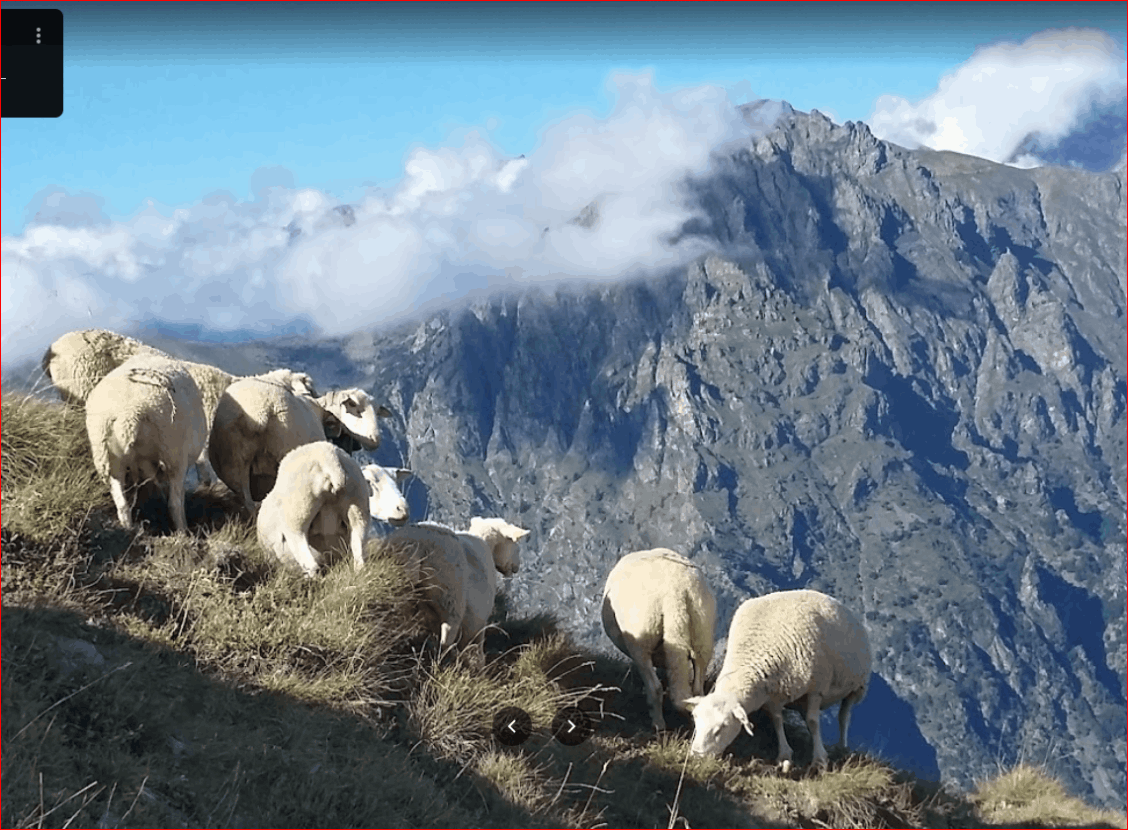
10.1- Even a Small Flock can make a big Difference
Becoming friends with the La Salette Social-Net will be extremely beneficial also for those unable to receive Holy Communion, especially after joining the Movement as active members. The goal of the La Salette Network is to witness, inspire, and kindly invite every non practicing Catholic to give themselves a new opportunity. We will encourage, accompany, and explain how doable it can be to ask God and receive a new life through His beloved Church, starting with a simple act of repentance for not keeping the "Sabbath" Holy, followed by a comprehensive sacramental confession.
10.2- After absolution, a new wave of joy and peace will gradually begin for those who persevere. And for those still unable to receive sacramental absolution (and Holy Communion, as consequence), they can certainly express their repentance to a priest, asking his prayers to persevere from now on without missing future Sunday Masses, always making a spiritual communion while following his directions to regularize eventual canonic situations within the Church, with a humble, grateful, and patient heart.
10.3- Prayers that will certainly be answered as long as, from now on, they persevere without missing future Sunday Masses and other commandments, always making a Spiritual Communion, while following the instructions to regularize eventual canonical situations within the Church, with a humble, grateful and patient heart.
11- Thank You Loving Mother, for always encouraging and warning your children, at every visit.
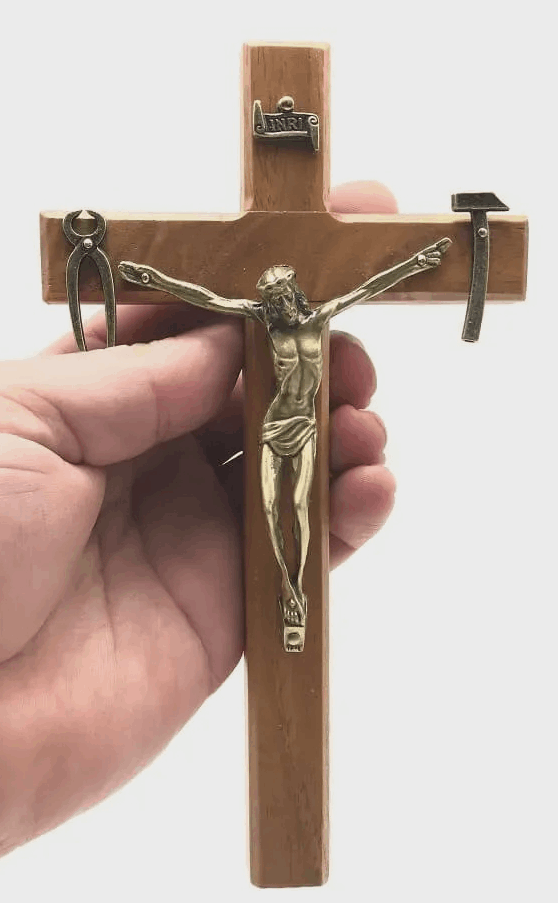
11.1- Let that sink in: Holy is His Name!
11.1- This is the replica of the Crucifix (side pic) our Lady was carrying on her chest during her visit. It's the only depiction of a Christian Crucifix in history showing the only two options each one of us have in life, whether hammering more "nails" (sins) in the Mystical Body of Jesus, or removing "nails" (virtues) by each act of Love, Mercy, reparation, etc.
At La Salette, Our Lady specifies two main refusals of her people: "Two offenses which make the arm of my Son so heavy":
11.2- [Disrespect for] The Seventh Day. The lack of respect for the "Seventh Day" takes us back to the first two books of the Bible, Genesis and Exodus. Therefore, a clear violation of the Ten Commandments. How do we honor “the day that God has reserved for Himself,” the day when we can meet “face to face” with God? Is it really a day of rest for free people, the Lord’s Day as it should be for us, children of God? A day of assembly for brothers and sisters in need of reconciliation? Christ inaugurated, with His resurrection, the first day of the new creation (Sunday). We are called to live as children of God. Therefore, in this life that transcends death, we should enter the Lord’s Day as a day without sunset, with a deep expectation and awareness that we are children in the Son, because we are truly adopted brothers of Jesus, our Brother-Redeemer and the only Son of God.
11.3- [Disrespect] for the Name of My Son (Holy is His name). The Virgin comes to tell us again: “Holy is His name.” Respect Him! Always. The “Fear of God” is a prerequisite for all blessings. "There is no other name under heaven given among men for salvation" (Acts 4:12). Do not blaspheme, but do everything good in the name of the Lord Jesus... (Col 3:17), that is, in the manner of Christ and according to the Holy Spirit.
12- No Time to Pray, to go to Mass, but Plenty of Time for Entertainment, Distractions, Sports, Food, Social Media, Gossip, etc.
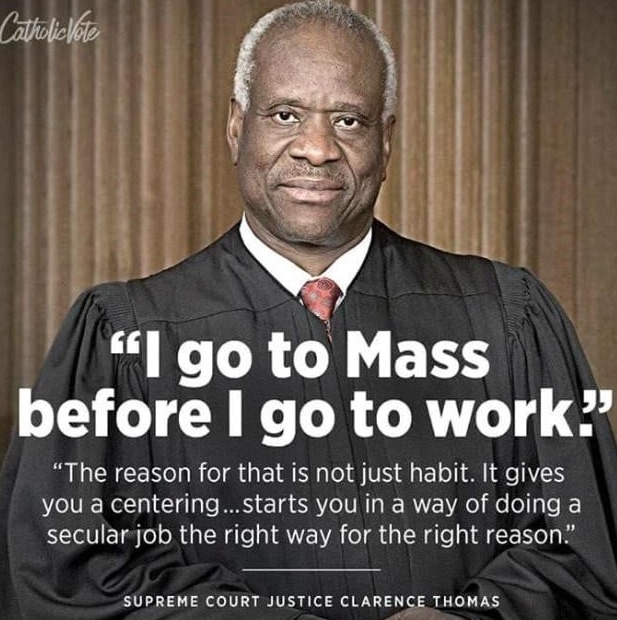
12.1- Are we always too busy? No time to go to Mass even on Sundays?
It is really a matter of Faith and submission. The sincere desire and determination to live with Christ and in Christ, as a servant within His Church, and not as a mere “tourist” using His Church. A great testimony to this can be inferred from the extraordinary life of one of the most important and respected members of the US Supreme Court, Justice Clarence Thomas. Are we busier and more burdened with daily responsibilities than he, who finds time to go to Mass every day?
12.2- Whether you agree or not (because it may seem like an extreme interpretation), it is actually perfectly rational to apply to non-practicing Catholics the strongest negative conclusion of Jesus, uttered in His parable transcribed by St. Matthew (in 5:13), “You are the Salt of the Earth…”. Yes, Jesus warned each of us that whoever loses the power to live as “Salt” here on Earth will become totally useless and will be of no use to anyone except to be thrown out and trampled underfoot by men. Can any Catholic who does not keep any of the Five Commandments of His Church all the time still retain some remnant of the power to Salt with Christ? Isn’t that the reason we were Baptized, to bear fruit of holiness and fruit that will last?
